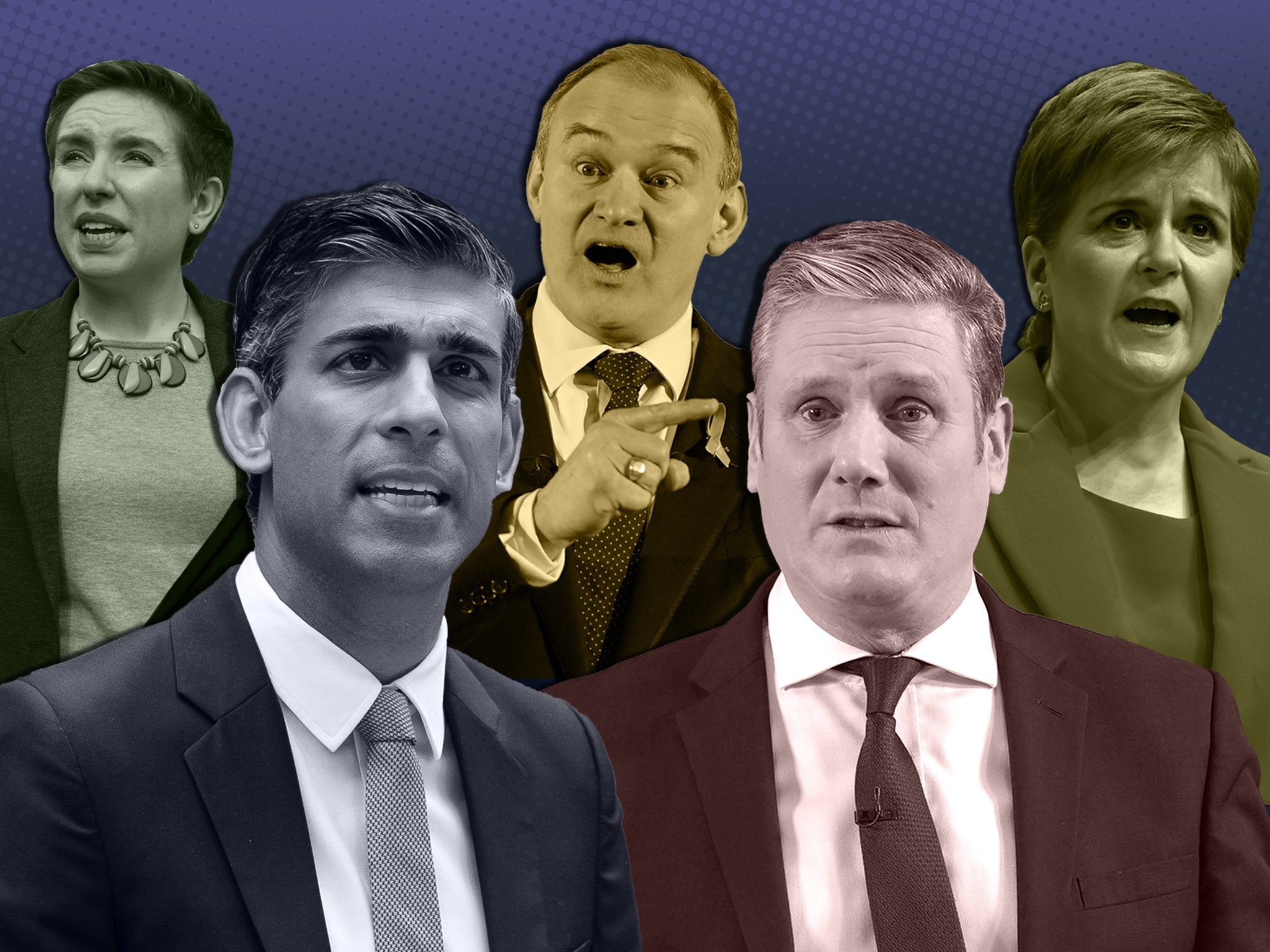I’ve been left politically homeless by a refusal to fully address the effects of Brexit
In a personal essay, Mick O’Hare discusses the idea that, as somebody who still believes Britain would be stronger in Europe, he is unable to vote for a party that represents his view – because there isn’t one


I write this with some despair: as somebody who campaigned to remain in the European Union in 2016, and has since become what certain quarters would label a “Remoaner” (a label I wear proudly), I now have no political home.
At a time of near-unprecedented national strife, it is clear that rejoining the EU is the one act that can transform this country and set it back on the road to prosperity. And yet – for reasons that are in equal parts baffling and infuriating – that is not an option that is being offered by any major political party.
Britain’s problems are seemingly caused by anything – anything – but Brexit. It seems Labour and the Lib Dems are so scarred by past electoral failures, and the Tories so frightened to point out how badly Brexit has gone, that we will not see any shift in their positions before the next general election. Which leaves voters like me in a pickle.
For me, the economic consequences of Brexit were never the biggest issue (although they are rapidly becoming so). It was about the shame of effectively saying “Get lost” to our neighbours and allies, and what we would lose by doing that. It was about closing off the opportunity to live alongside, love, learn from, and spend time with people who were happy to share their cultures with us. It is a huge, immeasurable loss. But now that we are going to be poorer (financially as well as spiritually), perhaps the time has come to reconsider what was, in hindsight, the most irresponsible decision ever agreed on by a liberal democracy.
Six years down the line, I believe we are bearing the fruits of that decision. And they are pretty rotten. I have a personal list: collapsing trade with the EU (down by 16 per cent); the hit to the UK’s GDP (down by as much as 5.5 per cent); the slowest-growing economy in the G7; recession; loss of inward investment to the UK; a contribution to staff shortages leading to crises in social care, the NHS, hospitality and agriculture (among other sectors); untold damage to finance, fisheries and farming; the signing of rushed trade deals; exclusion from pan-European projects; and the baleful effects of the Northern Ireland protocol.
The Independent’s Adam Forrest wrote on 31 December that 2022 seemed to be “the year of Brexit regret”, when it finally dawned on the majority of the British public that things really weren’t going well. Savanta’s political director Chris Hopkins says it could be that many people overestimated the potential benefits of Brexit. “There is definitely a sense that the process has been bungled, and that the benefits Leavers were promised haven’t really materialised,” he adds.
Even Brexiteers are becoming frustrated. I have seen blame attributed to outside forces: the EU, “Remoaners” who won’t accept the result, or just plain bad luck. But David Davis, once the secretary of state for exiting the European Union, has accepted that Brexit has “increased the burden” on British businesses.
Even without the baleful economic effects of leaving that are now poking through, I’d have been overwhelmingly in favour of rejoining. As an internationalist, I believe that discontent with international institutions, whatever their faults – and of course, the EU, just like the UN or any other large organisation, has its faults – cannot be resolved by looking in from the outside.
Yet no national party that could be described as mainstream seems to want to engage with the issue fully. Keir Starmer insists that Labour won’t even consider rejoining the customs union or the single market, saying that to do so would just create further division. A Labour Party spokesperson assured me that “there can be no return to freedom of movement”.
Labour’s officially stated position is that it has a “five-point plan to make Brexit work”. Apparently it will “deliver on the opportunities Britain has ... and end the Brexit divisions once and for all”. I’m pretty certain it won’t. And I cannot in all seriousness vote for a party that pretends it can.
Even the Liberal Democrats will only nod in the direction of “aspiring to have closer ties”, while the ostensibly pro-Europe Green Party admits that the “decision to leave the EU cannot be immediately reversed”.
The SNP – which has more MPs than the Lib Dems in the House of Commons – is, of course, a notable rejoin exception, but only a proportion of British voters have the opportunity to cast their vote for Nicola Sturgeon’s party.
Unsurprisingly, the Conservative Party’s position has little to cheer the pro-EU voter. Its official policy is the usual mantra: “There will be no political alignment with the EU. We will keep the UK out of the single market, out of any form of customs union, and end the role of the European Court of Justice. This relationship will be one that allows us to take back control of our laws, take back control of our money, take back control of our borders.” A spokesperson told me: “We are taking full advantage of the numerous benefits of Brexit. We have taken back control of our borders and axed red tape, saving businesses and consumers money.” Some of this is demonstrably untrue.
So what should I – and those of my politically homeless ilk – do? How should we vote when no party is addressing this matter, which we believe to be so important? I turned to Best for Britain, which campaigns for ever closer ties to the EU, for its take. Its chief executive, Naomi Smith, said: “Britain’s outdated voting system is a national gerrymander, which disenfranchises millions and more often than not hands total power to the Conservative Party with a minority of votes.
“This is particularly egregious when poll after poll consistently shows that the British public are in favour of much more internationalist policies than those being served up by the government, most recently on Brexit, with most now recognising it was a mistake and wanting another vote. While Labour look nailed-on to win, with potentially two years to go and the electoral system skewed in favour of the Tories, those who want to see change need to vote tactically.”
Smith admits that, in some constituencies, this may mean voting for a party with whose policies you may not totally agree. “I think it’s inevitable that the UK will move back into alignment with the EU, and hopefully rejoin at some future point, but that starts with fixing [Boris] Johnson’s terrible deal, and politicians levelling with the public on the reality of Brexit,” she says. “The longer they refuse to do this, the more damage will be done to UK businesses and society, and that’s why we’re campaigning for change as soon as possible.”
I would endorse that, but the silence from our main political parties shows no sign of abating. So as a lost political soul, I contacted each party in turn to ask the following question: as a floating voter who wishes the UK to rejoin the European Union, why should I vote for your party at the next general election?
At the time of writing, I have yet to hear back from the Labour or Conservative parties, although in the same week as I posed the question, Labour’s shadow secretary of state for levelling up, Lisa Nandy, described reversing Brexit as a “fantasy”.
The Liberal Democrats replied to me with a quote from their foreign affairs spokesperson, Layla Moran, which said: “We continue to believe that Britain’s best future is at the heart of Europe – and our long-term ambition is to see the UK lead from the front in Europe again. The takeover of the Conservative Party by anti-European ideologues has left ties between the UK and Europe deeply damaged, and much trust has gone. This will have to be rebuilt over time. It begins with easy wins like ensuring our participation in Horizon Europe, then we would seek to negotiate a veterinary agreement to help resolve issues with the Northern Ireland protocol, and eventually seek to join the customs union and single market.” Soothing noises at least.
Meanwhile, the Green Party responded to say that – as soon as the political climate is conducive to it – the party is committed to reapplying for EU membership.
In the constituency of my birth, Batley and Spen in West Yorkshire, I speak to Damian Halls, a shop assistant who in 2016 handed out Leave leaflets at the local bus station. He tells me: “I can’t actually believe I fell for it. I voted Leave in 2016 and for Boris Johnson in 2019. Mainly I was hoping for the £350m a week for the NHS. I thought all our money was going to other countries. A lot of my friends still believe in this stuff, but at some point you have to admit you’re wrong. I honestly feel an idiot.”
“We were sold a pup,” adds Kirsten Wardle, a healthcare worker who won’t say which way she voted in 2016. “Seems a bit obvious now, but how can Eton and Oxford-educated Boris Johnson and Jacob Rees-Mogg convince people they are not of the elite? Somehow they did.”
Personally, I’m particularly interested in Labour. Why won’t the party – led by Starmer, himself a former Remain campaigner – go further in the relationship? As Alastair Campbell, Tony Blair’s former director of communications, has so eloquently put it: “So scared is the Labour leadership of upsetting former Brexit voters that it has ended up defending a policy that plenty of people once voted for but now realise was a scam. They know Brexit and levelling up were simply lies, through their personal experience of both. Yet still Labour pretends it can ‘Make Brexit Work’. It can’t. Nobody can.”
Of course, the elephant of enduring cliche, plonked on our living room sofas in the space where Guy Verhofstadt should be sitting, is whether the EU would even contemplate having us back. If not, as some have argued, then why bother campaigning to rejoin at all? Well, the statistics vary. The French, for example, seem more adverse than most to a potential UK reapplication; conversely, there are clear favourable majorities in nations such as Germany and the Netherlands.
Unfortunately, while businesses (both in the UK and EU) would welcome the return of Britain to the bloc, politicians are more sceptical. And at the end of the day, they’d be the ones voting on it.
Verhofstadt – the former prime minister of Belgium and the European parliament’s former Brexit coordinator – offers hope for me: “I look forward to the day that the UK will rejoin the EU,” he says. “Brexit has proved a disaster for Britain and for Europe. I am reminded of a Margaret Thatcher quote, ‘Just think for a moment. A single market without barriers – visible or invisible – giving you direct access to 300 million of the world’s wealthiest and most prosperous people. On your doorstep’. Future generations may regret the country’s decision to leave, but there will be a generation, a young generation in the coming decades, who will say, ‘What have we done? We want to go back’.”
I realise my views are by no means universal; indeed, perhaps they pertain to only a few. But meanwhile, for me and for those of like mind, the search for a political home continues.






Join our commenting forum
Join thought-provoking conversations, follow other Independent readers and see their replies
Comments